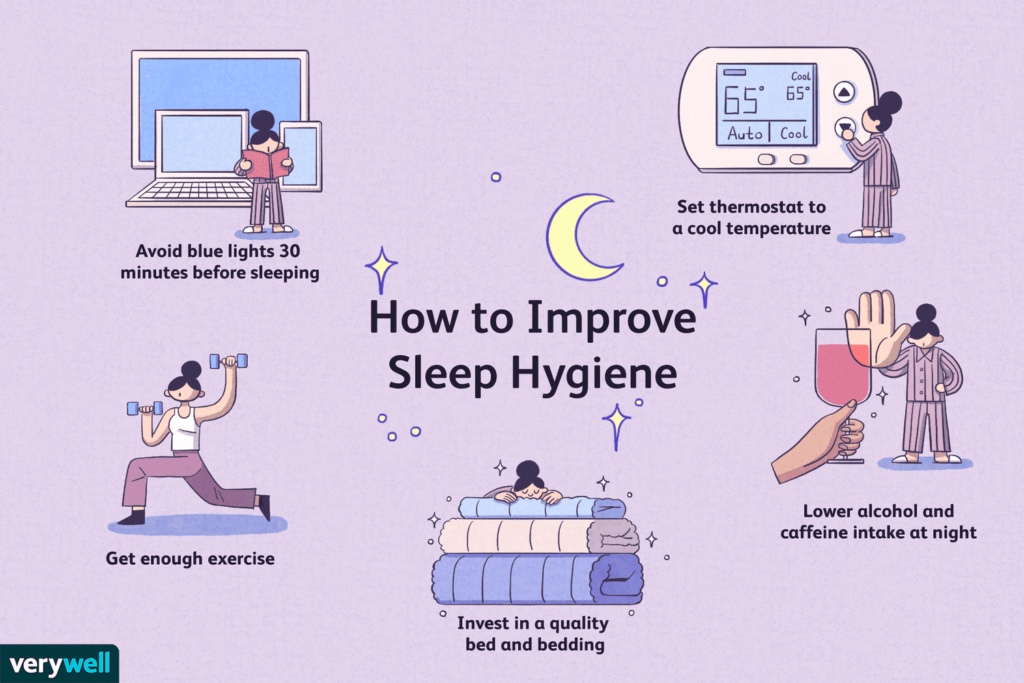In today’s fast-paced world, achieving a restful night’s sleep can often feel like an elusive goal. However, understanding and implementing 5 easy ways to improve your sleep quality can significantly enhance your overall well-being. Quality sleep is essential for physical health, mental clarity, and emotional stability. By making simple adjustments to your daily routine and sleep environment, you can transform your sleep experience and wake up feeling refreshed and energized.
This article will guide you through five practical strategies that can help you achieve better sleep quality. From optimizing your sleep environment to establishing a calming bedtime routine, each method is designed to address common sleep disruptors. You will learn how factors such as light exposure, noise levels, and even your diet can impact your ability to fall and stay asleep. By the end of this article, you will have a comprehensive toolkit to tackle sleep challenges and improve your nightly rest.
Whether you struggle with insomnia, frequently wake up during the night, or simply want to enhance your sleep quality, these tips are tailored for everyone. We encourage you to read on and discover how small changes can lead to significant improvements in your sleep patterns. Embrace the journey to better sleep and unlock the benefits of a well-rested mind and body!
Sleep quality is essential for overall health and well-being. Many people struggle with sleep issues, which can lead to various health problems. Here are five easy ways to enhance your sleep quality.
Establish a Consistent Sleep Schedule
One of the most effective ways to improve your sleep quality is to establish a consistent sleep schedule. Going to bed and waking up at the same time every day helps regulate your body’s internal clock, making it easier to fall asleep and wake up feeling refreshed. This consistency reinforces your body’s natural sleep-wake cycle, which can lead to deeper and more restorative sleep.
To create a sleep schedule, aim to go to bed and wake up at the same time, even on weekends. This practice can help you avoid the negative effects of sleep deprivation and improve your overall mood and cognitive function. Additionally, consider setting a bedtime routine that signals to your body that it’s time to wind down, such as reading a book or practicing relaxation techniques.
Create a Sleep-Inducing Environment
Your sleep environment plays a crucial role in determining the quality of your sleep. A dark, quiet, and cool room can significantly enhance your ability to fall asleep and stay asleep. Consider using blackout curtains to block out light, earplugs or white noise machines to minimize noise, and adjusting the thermostat to a comfortable temperature.
Additionally, investing in a comfortable mattress and pillows can make a significant difference in your sleep quality. The right bedding can provide the support your body needs, reducing discomfort and allowing you to enjoy a more restful night. Personalizing your sleep environment to suit your preferences can lead to improved sleep quality over time.
Limit Exposure to Screens Before Bed
In today’s digital age, many people find themselves using screens right before bedtime. However, the blue light emitted by phones, tablets, and computers can interfere with the production of melatonin, the hormone responsible for regulating sleep. Limiting screen time in the hour leading up to bedtime can help your body prepare for sleep more effectively.
Instead of scrolling through social media or watching TV, consider engaging in relaxing activities such as reading a physical book, practicing meditation, or taking a warm bath. These alternatives can help signal to your body that it’s time to wind down, promoting better sleep quality and a more restful night.
Be Mindful of Food and Drink
Your diet can significantly impact your sleep quality. Consuming large meals, caffeine, or alcohol close to bedtime can disrupt your sleep patterns. It’s essential to be mindful of what you eat and drink in the hours leading up to sleep. Aim to have your last meal at least two to three hours before bedtime, and limit caffeine intake in the afternoon and evening.
Instead, consider incorporating sleep-friendly foods into your diet, such as almonds, turkey, and chamomile tea. These foods contain nutrients that can promote relaxation and improve sleep quality. Staying hydrated is also important, but try to limit fluid intake right before bed to avoid nighttime trips to the bathroom.
Incorporate Relaxation Techniques
Incorporating relaxation techniques into your bedtime routine can significantly improve your sleep quality. Practices such as deep breathing, progressive muscle relaxation, and mindfulness meditation can help calm your mind and prepare your body for sleep. These techniques can reduce stress and anxiety, which are common barriers to a good night’s sleep.
Consider dedicating a few minutes each night to practice these relaxation methods. You might also explore yoga or gentle stretching, which can help release tension in your body and promote a sense of calm. By making relaxation a priority, you can create a more conducive environment for restful sleep.
| Method | Description |
|---|---|
| 1. Establish a Sleep Schedule | Go to bed and wake up at the same time every day, even on weekends. This helps regulate your body’s internal clock. |
| 2. Create a Relaxing Bedtime Routine | Engage in calming activities before bed, such as reading, taking a warm bath, or practicing meditation to signal your body it’s time to wind down. |
| 3. Optimize Your Sleep Environment | Make your bedroom conducive to sleep by keeping it dark, quiet, and cool. Consider using blackout curtains, earplugs, or a white noise machine. |
| 4. Limit Exposure to Screens | Avoid screens from phones, tablets, and computers at least an hour before bedtime, as the blue light emitted can interfere with melatonin production. |
| 5. Watch Your Diet | Avoid large meals, caffeine, and alcohol close to bedtime. Instead, opt for light snacks if you’re hungry, and stay hydrated throughout the day. |

